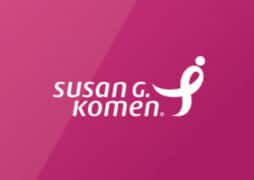COVID-19 Vaccine Should Not Unduly Delay Screening, May Require Conversation with Doctor
Susan G. Komen®, the world’s leading breast cancer organization, urged women to not unduly delay their regularly scheduled breast cancer screening and to speak with a doctor immediately if she, or he, is displaying any signs of breast cancer. The renewed call came following new recommendations from the Society of Breast Imaging (SBI), which states that women who receive a COVID-19 vaccine may experience swollen lymph nodes that may impact the results of a mammogram and should therefore either schedule mammograms before or delay mammograms for at least four weeks following their shot.
Lymph node swelling in the armpit near the shot location is a side effect of some vaccines, including COVID-19 vaccines, and is likely an indicator that the immune system is responding to the vaccine. However, women who experience this post-vaccine side effect may worry that they have developed breast cancer, and the swollen lymph nodes may display on a mammogram. Komen noted that some women may experience this swelling, but it is unclear at this point how prevalent it is.
The Society of Breast Imaging issued these recommendations to ensure the radiologists who read mammograms are aware that such swelling may occur in patients who were recently vaccinated. Among other recommendations, SBI suggested that mammography providers ask patients about their COVID-19 vaccination status, and consider scheduling screening exams prior to receiving the first dose of the vaccine or 4-6 weeks after the second dose.
“We are deeply concerned about the reduction in breast cancer screening we have already seen in women concerned about COVID-19 exposure, and potentially a surge in later stage diagnoses and worse outcomes, as a result,” said Victoria Wolodzko, Komen’s senior vice president of mission. “It is important to note that the SBI recommendations are not based on doctors seeing a significant increase in women with confusing symptoms. Rather, SBI was issuing guidance to inform women and radiologists of the possibility and provide them with recommendations to improve the care being given to women at this time.”
Wolodzko added, “As such, women should not preemptively delay their screening just because they have been vaccinated, unless it is convenient and a new time can be secured. A recent vaccination is important information, but not necessarily a cause for delay. And women should contact their doctors particularly if they are displaying any warning signs of breast cancer.”
Komen noted that knowledge is power. Women should have conversations with their health care provider about when screening is right for them and let their providers know about recent vaccinations. Not all women will experience this side effect of COVID vaccines, but all women are at risk of breast cancer.


